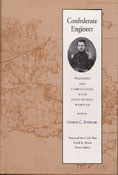Confederate Engineer
Training and Campaigning with John Morris Wampler

- Author(s): Kundahl, George G.
- Series: Voices of the Civil War
- Imprint: Univ Tennessee Press
- Publication Date: 2000-06-21
- Status: Active
- Available in Hardcover - Cloth: Price $34.00 | Buy Now
Compared with generals or even foot soldiers, relatively little is known about the role played by engineers during the Civil War. This first study of Confederate engineering in more than forty years combines biography with a comprehensive overview of the profession to present the life and accomplishments of one talented individual.
John Morris Wampler was a topographical engineer in the Provisional Army of the Confederate States and eventually became chief engineer of the Confederate Army of Tennessee. Based on extensive use of Wampler’s unpublished correspondence and journals, the biography follows his experiences before hostilities and then during the war in both major theaters. It also draws on the writings of his wife, Kate, to show how she struggled to hold their family together during the fighting. The combination of both the husband and wife’s perspectives on the war makes this treatment unique.
Wampler’s experiences spanned the range of activities undertaken by a Civil War engineer, and by midway through the conflict he had worked on engineering projects in eight of the Confederate states, as well as Maryland and Kentucky. While his specialty was cartography, he also built and repaired earthen works, laid out and prepared hasty defensive positions, conducted reconnaissance, reconstructed bridges, and mended railway lines and routes of march.
Confederate Engineer also presents a fascinating account of antebellum engineering, showing the importance of the U.S. Coast Survey as a training ground for both Union and Confederate engineers. In addition, the book contains valuable material on the Confederate invasion of Kentucky—including the battle of Perryville—and on the defense of Battery Wagner at Charleston.
By focusing on a staff engineer, the narrative provides a fresh perspective on the conduct of military operations during the Civil War. In telling this story, the author never loses sight of the human dimension of an ordinary man confronting the challenges of extraordinary times.
The Author: George G. Kundahl is a retired major general in the U.S. Army. He served as executive director of the U.S. Securities and Exchange Commission, 1981–1990, and as a principal deputy assistant secretary of defense, 1990–1993. He received a Ph.D. in political science from the University of Alabama.
